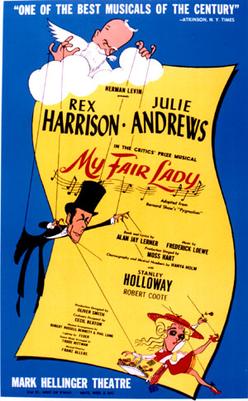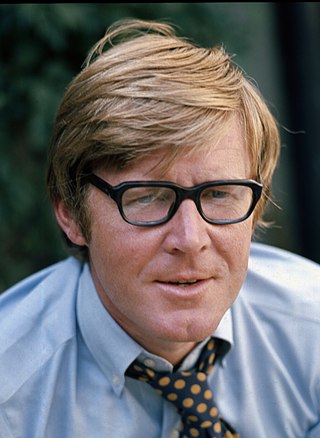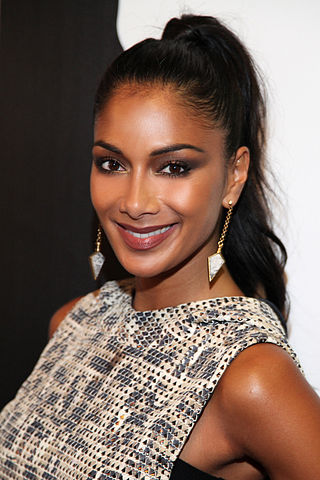Related Research Articles

My Fair Lady is a musical with a book and lyrics by Alan Jay Lerner and music by Frederick Loewe. The story, based on the 1938 film adaptation of George Bernard Shaw's 1913 play Pygmalion, concerns Eliza Doolittle, a Cockney flower girl who takes speech lessons from professor Henry Higgins, a phonetician, so that she may pass as a lady. Despite his cynical nature and difficulty understanding women, Higgins grows attached to her.

Alan Bennett is an English playwright, author, actor and screenwriter. Over his entertainment career he has received numerous awards and honours including two BAFTA Awards, four Laurence Olivier Awards, and two Tony Awards. He also earned an Academy Award nomination for his film The Madness of King George (1994). In 2005 he received the Society of London Theatre Special Award.

Private Lives is a 1930 comedy of manners in three acts by Noël Coward. It concerns a divorced couple who, while honeymooning with their new spouses, discover that they are staying in adjacent rooms at the same hotel. Despite a perpetually stormy relationship, they realise that they still have feelings for each other. Its second act love scene was nearly censored in Britain as too risqué. Coward wrote one of his most popular songs, "Some Day I'll Find You", for the play.
Sir Richard Charles Hastings Eyre is an English film, theatre, television and opera director. Eyre has received numerous accolades including three Laurence Olivier Awards as well as nominations for six BAFTA Awards and two Tony Awards. He was appointed a Commander of the Order of the British Empire (CBE) in the 1992 News Year Honours, and knighted in the 1997 New Year Honours.

Charles Peter Keep Edwards is an English actor with a career in theatre, TV, and film, most notable for playing Michael Gregson in Downton Abbey (2012–2013), Dr Alexander McDonald in The Terror (2018), Sir Martin Charteris in The Crown (2019–2020), and Lord Celebrimbor in The Lord of the Rings: The Rings of Power (2022–2024).

The Laurence Olivier Awards, or simply TheOlivier Awards, are presented annually by the Society of London Theatre to recognise excellence in professional theatre in London. The awards were originally known as the Society of West End Theatre Awards, but they were renamed in honour of the British actor of the same name in 1984.

The Laurence Olivier Award for Best Actress in a Musical is an annual award presented by the Society of London Theatre in recognition of achievements in commercial London theatre. The awards were established as the Society of West End Theatre Awards in 1976, and renamed in 1984 in honour of English actor and director Laurence Olivier.
The Laurence Olivier Award for Best Musical Revival is an annual award presented by the Society of London Theatre in recognition of achievements in commercial London theatre. The awards were established as the Society of West End Theatre Awards in 1976, and renamed in 1984 in honour of English actor and director Laurence Olivier.
The Laurence Olivier Award for Best Actor in a Musical is an annual award presented by the Society of London Theatre in recognition of achievements in commercial London theatre. The awards were established as the Society of West End Theatre Awards in 1976, and renamed in 1984 in honour of English actor and director Laurence Olivier.

Tim Hatley is a British set and costume designer for theatre and film. He has won the Tony Award for Best Set Design and Best Costume Design, the Drama Desk Award for Outstanding Set Design, the Drama Desk Award for Outstanding Costume Design, and the Laurence Olivier Award for Best Set Design.
Joanna Riding is an English actress. For her work in West End musicals, she has won two Laurence Olivier Awards, and has been nominated for three others.

Shockheaded Peter is a 1998 musical using the popular German children's book Struwwelpeter (1845) by Heinrich Hoffmann as its basis.
Tim Goodchild is a set and costume designer from Great Britain.
The WhatsOnStage Awards, founded in 2001 as the Theatregoers' Choice Awards, are a fan-driven set of awards organised by the theatre website WhatsOnStage.com, based on a popular vote recognising performers and productions of English theatre, with an emphasis on London's West End theatre.
The 1977 Society of West End Theatre Awards were held in 1977 in London celebrating excellence in West End theatre by the Society of West End Theatre. The awards would not become the Laurence Olivier Awards, as they are known today, until the 1984 ceremony.
The 1979 Society of West End Theatre Awards were held in 1979 in London at the Café Royal, celebrating excellence in West End theatre by the Society of West End Theatre. The awards would not become the Laurence Olivier Awards, as they are known today, until the 1984 ceremony.
The 2001 Laurence Olivier Awards were presented by the Society of London Theatre in 2001 at the Lyceum Theatre, London, celebrating excellence in West End theatre.
The 2003 Laurence Olivier Awards, celebrating excellence in West End theatre, were presented by the Society of London Theatre on Friday 14 February 2003, at the Lyceum Theatre, London. A recording of the ceremony was broadcast the next night on BBC Two.
The 2005 Laurence Olivier Awards were held in 2005 in London celebrating excellence in West End theatre by the Society of London Theatre.
The 2006 Laurence Olivier Awards were held in 2006 in London celebrating excellence in West End theatre by the Society of London Theatre.
References
- 1 2 "Winners of the 2002 Laurence Olivier Awards". LondonTheatre.co.uk. 15 February 2002. Archived from the original on 26 April 2019. Retrieved 10 May 2022.
- ↑ "Olivier Winners 2002". officiallondontheatre.com. Society of London Theatre. Archived from the original on 15 June 2018. Retrieved 5 May 2022.